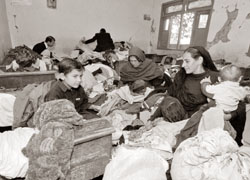|
DAILY NEWS ONLINE |
|
|
|
OTHER EDITIONS |
|
|
|
|
|
|
|
|
|
OTHER LINKS |
|
|
|
|
|
|
  |
|
Along with the quake explodes the poverty bombIt is as if the long-ticking poverty bomb in South Asia has exploded along with Pakistan's quake catastrophe, which has reportedly killed more than 73,000 and rendered multitudes homeless and destitute.
For, it is now all too obvious that, come natural disasters or convulsions of any kind, it is the poor who are most affected and reduced to complete misery, destitution and powerlessness. Above all, we have proof in this mind-numbing mayhem that, decades-long, State-spewed, anti-poverty rhetoric notwithstanding - besides SAARC's professed commitment to reduce regional poverty - the poor of South Asia have barely been empowered, cared for and endowed with the means to endure natural or man-made disasters. In a flash, as it were, the utter vulnerability of South Asia's poor could be nakedly exposed. This is the shattering message from Kashmir's trembling mountains. The challenge facing the international community in the aftermath of the quake disaster was cogently outlined by UN Secretary General Kofi Annan. Speaking of the need to redouble efforts to help the quake victims the UN Secretary General said: "The pitiless Himalayan winter is almost upon us and growing more and more severe every week... We must sustain our efforts to keep people as healthy and strong as possible until we can rebuild." Hopefully, the $ 8.5 billion in aid pledged by the world community to Pakistan recently would be translated into real green-backs and used for rebuilding the lives of the quake victims but the vast magnitude of the human suffering spawned by the disaster provokes more and more disquieting questions, particularly for those global powers which have taken on themselves to charter the current world order. In fact kindred questions were raised by the Asian tsunami of December 2004 which , perhaps unprecedentedly in this region, underlined the link between poverty, powerlessness and misery. A poser which has been glaringly thrown to the surface by these reverberations is the sufficiency of aid or charity as an empowerment tool. True, the dying and the destitute need to be cared for immediately, but once the "rebuilding" of lives gets under way, what firm guarantee would we have that these aid recipients would be sufficiently empowered to endure future natural or man-made disasters? Besides, would Third World states learn the relevant lessons from these calamities and put in place the mechanisms and institutional, arrangements which would ensure the steady empowerment of the regions poor? We are expecting the predictable reaction from cynical sections, when we raise such questions, that natural disasters being unexpected and devastating, they could overpower anyone anywhere. Such reactions only possess superficial merit. What should be remembered is that education is a crucial aspect of empowerment and education enables people to fend for themselves better and even equip themselves with the necessary fore - knowledge to escape some of the more dire consequences of natural and man-made calamities. Thus, if states provide the people with education on an equitable basis, besides material empowerment, the powerlessness and misery coming in the wake of calamities would not be so extensive and excruciating. Hopefully, these issues would receive the attention of, for instance, the political leadership of the US and China, currently conducting talks in China on issues of crucial relevance in their bilateral ties. What is increasingly drawing the US to Asia is the consideration that the 21st century belongs to Asia; the emerging economic growth zone of the globe. Nevertheless, poverty remains rampant in Asia, particularly in West, South-West and Southern Asia, as the recent natural disasters agonisingly demonstrate. How could such vast oceans of suffering be reconciled with the optimistic scenarios churned out in the West about rising Asian prosperity? If there is "development" in Asia - apparently - something is fundamentally wrong with it. How could one account, if not, for the vast poverty in Asia? Obviously, something is seriously lacking in the development models adopted by Third World countries in Asia. Western leaders, such as US President George Bush, and his counterparts in the leading powers of Asia, could help in containing conflicts fed by "fundamentalism", by addressing their minds to these ignored issues rather than by collaborating to fight "terror" by military means. |
|
|
|


